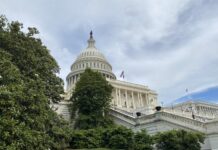
The virus privacy debate is heating up as the U.S. government works with businesses to develop guidelines for requirements that employees and customers prove they received the COVID-19 vaccine.
The White House this week dismissed chances that a federal mandate is coming to force people to carry vaccine passports or submit personal information to be kept in a database. Still, as with sometimes controversial face mask policies businesses and agencies implemented during the pandemic, some are interested in setting vaccination as a threshold for people to get together again.
White House press secretary Jen Psaki said President Joe Biden’s administration would offer guidance to the business sector about the ramifications of vaccine credentials to deal with concerns over privacy, security, and discrimination.
Multiple companies are developing smartphone-based apps or vaccine passports as more people travel, return to their workplaces, and resume other everyday aspects of their lives.
“As these tools are being considered by the private and nonprofit sectors, our interest is very simple from the federal government, which is Americans’ privacy and rights should be protected, and so the — so that these systems are not used against people unfairly,” Psaki said this week. “There is a movement, as you know, in the private sector to identify ways that they can return to events where there are large swaths of people safely in soccer stadiums or theaters. And that’s something that — that’s where the idea originated, and we expect that’s where it will be concluded.”
As the vaccination distribution has skyrocketed in weeks, speculation intensified over whether the federal and state governments would require individuals to have digital or paper credentials showing if they’ve received immunity.
Thus far, the paper record comes from a small card with the Centers for Disease Control and Prevention’s label detailing the dose’s timing and manufacturer.
Georgia surpassed 4 million doses of COVID-19 vaccines distributed this week, while nearly 108 million people have taken at least one dose across the nation.
Also this week, Biden’s administration and Gov. Brian Kemp came out in opposition to potential government-mandated vaccine passports.
“I do not and will not support any kind of state-mandated vaccine passport,” Kemp said in a tweet. “While the development of multiple safe, highly effective COVID-19 vaccines has been a scientific miracle, the decision to receive the vaccine should be left up to each individual.”
As the coronavirus spread throughout the U.S. last year, many major corporations and other businesses implemented policies that required employees and customers to wear face masks.
Cities including Savannah and Atlanta also began mandating people cover their faces while on public and government property. At one point, the state sued Atlanta officials to undo the city’s mask requirements before calling a truce last summer.
Over the last year, requirements for mask use on private property and local government face-covering policies varied widely, often along Georgia’s rural and metropolitan divides and pitting political opponents against each other.
And now as more people resume eating inside restaurants or traveling aboard a plane, it’s important not only to take the vaccine but also wear face coverings and follow many of the same guidelines as during the pandemic’s peak last summer, said Dr. Henry Wu, the director of Emory University’s TravelWell Center.
Wu offered his remarks during a Wednesday press briefing on vaccinations, summer travel, and immunization requirements.
Yet to be determined is how vaccination policies play out in the business community, colleges, and other places with an interest in determining if someone is vaccinated, he said.
“On the business side of things, I certainly also understand the same way that businesses require shoes when you need to enter the store to take measures to protect their customers and their business,” Wu said.
Wu said it could be handy for someone to carry improved vaccine documentation beyond a paper card when traveling abroad since many countries require COVID-19 immunization to protect their citizens.
As summer approaches, the number of Georgians going out of town or traveling outside the country could reach pre-pandemic levels. In August, Hartsfield-Jackson Airport is expecting close to the same number of passengers as the record-breaking number of travelers from the same time two years ago.
Georgia’s coronavirus rates continue to decrease, although there is an uptick in some other parts of the country.
And just over a year after issuing a statewide stay-at-home order, Kemp announced Wednesday that he is rolling back the ban limiting the size of gatherings, eliminating the shelter-in-place order, and no longer requiring restaurants, bars, and gyms to enforce social distancing inside their establishments.
“We know hard-working Georgians cannot endure another year like the last,” Kemp said. “That is why beginning (Thursday), we are loosening the remaining restrictions on our economy here in Georgia.”
But it remains to be seen how many people who’ve gotten the COVID vaccine will feel comfortable crowding into restaurant dining rooms, music venues, and dance halls without knowing how many others in the shared space have gotten a shot.
Wu said the key to any type of vaccination passport is creating a better-standardized system that is more accurate and protects privacy.
“They could be designed to work with local entry policy, so rather than revealing details about your health, it just tells a border officer whether or not you need to be quarantined or tested on arrival,” he said.
The privacy concerns over immunization records spurred the state Legislature this year to pass a measure that allows Georgians to opt-out of the statewide and federal vaccine databases.
Georgians can exempt themselves and their children from the state registry and the federal database, which the CDC uses to determine how much vaccine supply a state receives in each shipment.
“We’re trying to strike an appropriate balance during this pandemic of respecting privacy, personal liberty but also making sure that we’re doing what we can to keep Georgians safe,” Rep. Trey Kelley, a Cedartown Republican, said last week.







